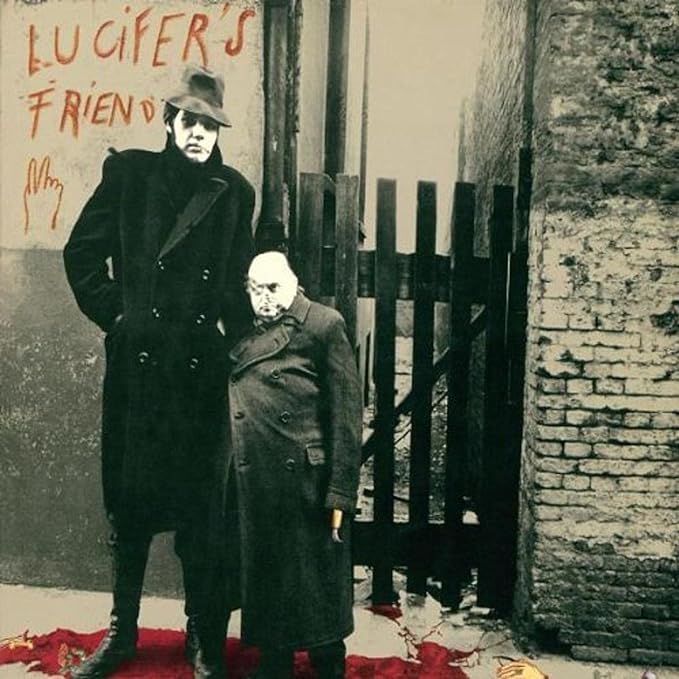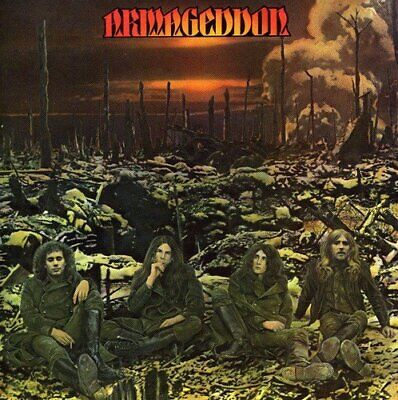 The golden age of concept albums is definitely over. Australian artist T.K. Bollinger goes against the tide in so many ways and on so many levels that a concept album isn't weird. To borrow the words of the artist himself: "A strange composite of songs and anti-songs, blended with treated field recordings." This will require some effort on your part. You have to dig in and work yourself through 28 songs, snippet of songs, sound effects and loose fragments. This album isn't something for a person being introduced to music (and probably not for a music expert and connoisseur either). On the album Bollinger has removed the boundaries between music and soundart, challenging our first sense with the aim to broaden your mind. The result is tough and chewy. Maybe this is a concept album, but then it's a very loose concept. The characteristic of a concept album is the coherence. In my opinion, this isn't a coherent album. The "songs" are short, and either hooked into each other or ends abruptly or slowly fades out. My personal favorites are "The Apologist (Part 1)", "The Apologist (Part 2)", "Failed Saints", "Darkest Days Over", "A Short Burst of Brightness" and "This Life Is All There Is". Other songs are weird, like "How to Kill Bill", "Wetware", "Bibbedy" and "Predictive Text". But, weird doesn't cut it alone. The songs need something more and else. This album is a little bit too weird, to be honest.
The golden age of concept albums is definitely over. Australian artist T.K. Bollinger goes against the tide in so many ways and on so many levels that a concept album isn't weird. To borrow the words of the artist himself: "A strange composite of songs and anti-songs, blended with treated field recordings." This will require some effort on your part. You have to dig in and work yourself through 28 songs, snippet of songs, sound effects and loose fragments. This album isn't something for a person being introduced to music (and probably not for a music expert and connoisseur either). On the album Bollinger has removed the boundaries between music and soundart, challenging our first sense with the aim to broaden your mind. The result is tough and chewy. Maybe this is a concept album, but then it's a very loose concept. The characteristic of a concept album is the coherence. In my opinion, this isn't a coherent album. The "songs" are short, and either hooked into each other or ends abruptly or slowly fades out. My personal favorites are "The Apologist (Part 1)", "The Apologist (Part 2)", "Failed Saints", "Darkest Days Over", "A Short Burst of Brightness" and "This Life Is All There Is". Other songs are weird, like "How to Kill Bill", "Wetware", "Bibbedy" and "Predictive Text". But, weird doesn't cut it alone. The songs need something more and else. This album is a little bit too weird, to be honest.
![]() About five years ago I compiled a list "10 neglected or forgotten albums (somewhat gothic)", read more here (opens in a new window). Today, I will delve into three of the albums. This course of action is a slight deviation from the central current of the site. But, I wasn't born a distinguished Ambassador and chief exponent of gothic country. Actually, there was a time when I was just a pimpled teenager exploring rock music in a wide range from glam to kraut. To be completely transparent, I wrote a piece about the albums in 2009 on the Swedish-speaking site cdrunda.se. It hasn't aged well. I take the artistic liberty of making some alterations in the original text. This blog post deals with Lucifer's Friend, Sir Lord Baltimore and Armageddon. On the surface, they don't have much in common. Lucifer's Friend came from Germany, Sir Lord Baltimore were Americans and Armageddon came from the U.K. They had different styles, although all bands - with a liberal interpretation - could be placed in to the broad rock genre. Despite the differences above, they have six characteristics in common:
About five years ago I compiled a list "10 neglected or forgotten albums (somewhat gothic)", read more here (opens in a new window). Today, I will delve into three of the albums. This course of action is a slight deviation from the central current of the site. But, I wasn't born a distinguished Ambassador and chief exponent of gothic country. Actually, there was a time when I was just a pimpled teenager exploring rock music in a wide range from glam to kraut. To be completely transparent, I wrote a piece about the albums in 2009 on the Swedish-speaking site cdrunda.se. It hasn't aged well. I take the artistic liberty of making some alterations in the original text. This blog post deals with Lucifer's Friend, Sir Lord Baltimore and Armageddon. On the surface, they don't have much in common. Lucifer's Friend came from Germany, Sir Lord Baltimore were Americans and Armageddon came from the U.K. They had different styles, although all bands - with a liberal interpretation - could be placed in to the broad rock genre. Despite the differences above, they have six characteristics in common:
1. All albums are undeservedly forgotten,
2. All albums are debut albums,
3. Two of the three debut albums are self-titled (Sir Lord Baltimore's second album was titled "Sir Lord Baltimore"),
4. The opening song is by far the best on all albums,
5. All bands had their heyday in the early or mid-1970s,
6. All bands have a biblical reference either in the band name or in the title of the debut album. Hard rock bands in the 1970s often chose pompous obliging names. Lucifer's Friend refers to the fallen angel (or more correctly, his friend) who becomes Satan. Sir Lord Baltimore's debut album is called "Kingdom come", which refers to the establishment of God's kingdom on Earth. Armageddon is the literal or a symbolic location where the final battle between good and evil is fought and a paraphrase for the end of the world.
Lucifer's Friend (Lucifer's Friend 1971)  An album cover should draw attention. However, this cover brings to mind more the Addams Family than German hard rock. Isn't that Uncle Fester on the right? Lucifer's Friend was formed in 1970 by Peter Hecht, Dieter Horns, Peter Hesslein, and Joachim Reitenbach. The band was looking for a singer and soon found John Lawton (born in England, but raised in Germany). Their self-titled debut album is heavily influenced by Black Sabbath and Led Zeppelin, but more organ-based. The album contains eight songs and opens with "Ride In The Sky". It has a bizarre beginning: a native American call, followed by a guitar riff and a horn signal. Lawton sings in a falsetto voice with a slight German accent.After this shocking opening the more blues-inspired "Everybody's Clown" follow with tempo changes and interludes with organ, guitar and choir. The third song "Keep Goin" has the exact same type of arrangement. "Toxic Shadows" sounds like Eric Dolphy meets Uriah Heep (if that's even possible to imagine). The fifth song "Free Baby" includes Hammond organ, bass lines and, in fact, quite beautiful vocals. "Baby, You're A Liar" is just sad. "In the Time of Job when Mammon was a Yippie" is one of the best songs on the album. The lyrics are bit silly (Yippies were the members of The Youth International Party - anti-authoritarian party formed in 1967 in the USA). The closing and title track "Lucifer's Friend" is melodic hard rock with all the right ingredients. When you have chosen a spectacular band name, then the lifestyle, music and lyrics must live up to the name. The band would change both members and even more musical direction (further listening is not recommended). Lawton would move up the food chain and ended up 1976-1979 in Uriah Heep (replacing singer David Byron who was fired due to serious alcohol problems). Lawton would eventually return to Lucifer's Friend in 1981. The original album is available on CD with five bonus songs (no added value).
An album cover should draw attention. However, this cover brings to mind more the Addams Family than German hard rock. Isn't that Uncle Fester on the right? Lucifer's Friend was formed in 1970 by Peter Hecht, Dieter Horns, Peter Hesslein, and Joachim Reitenbach. The band was looking for a singer and soon found John Lawton (born in England, but raised in Germany). Their self-titled debut album is heavily influenced by Black Sabbath and Led Zeppelin, but more organ-based. The album contains eight songs and opens with "Ride In The Sky". It has a bizarre beginning: a native American call, followed by a guitar riff and a horn signal. Lawton sings in a falsetto voice with a slight German accent.After this shocking opening the more blues-inspired "Everybody's Clown" follow with tempo changes and interludes with organ, guitar and choir. The third song "Keep Goin" has the exact same type of arrangement. "Toxic Shadows" sounds like Eric Dolphy meets Uriah Heep (if that's even possible to imagine). The fifth song "Free Baby" includes Hammond organ, bass lines and, in fact, quite beautiful vocals. "Baby, You're A Liar" is just sad. "In the Time of Job when Mammon was a Yippie" is one of the best songs on the album. The lyrics are bit silly (Yippies were the members of The Youth International Party - anti-authoritarian party formed in 1967 in the USA). The closing and title track "Lucifer's Friend" is melodic hard rock with all the right ingredients. When you have chosen a spectacular band name, then the lifestyle, music and lyrics must live up to the name. The band would change both members and even more musical direction (further listening is not recommended). Lawton would move up the food chain and ended up 1976-1979 in Uriah Heep (replacing singer David Byron who was fired due to serious alcohol problems). Lawton would eventually return to Lucifer's Friend in 1981. The original album is available on CD with five bonus songs (no added value).
Sir Lord Baltimore (Kingdom come 1970)
 Sir Lord Baltimore was formed in 1968 in New York, NY and not in Baltimore, ML as you might expect by Louis Dambra on guitar, Gary Justin on bass and John Garner on drums. Like many three-piece rock bands in the 1970s they sounded powerful. Sir Lord Baltimore played a distinctive guitar and bass-based hard rock. All band members sang. Garner (the drummer) was mainly responsible for the vocals. The band wasn't afraid of distortion, on the contrary, they embraced it. In a review of the debut album "Kingdom come" the term "heavy metal" was allegedly used for the first time. The album contains 10 songs and begins with the title song "Kingdom Come". The song starts hard with guitar and bass: then a guitar solo followed by vocals. "I hear sirens calling me / I fell prey unto the wind / Sail on, crimson majesty / Turn, turn, wheel of fortune, spin / Until my kingdom come / And then my will be done". The second song "I Got A Woman" is simple. The vocals are – what can I say – rough and distasteful. Next song "Hell Hound" continues in hard style with channel-separated effects. In "Helium head" it gets really noisy. "Ain't Got Hung On You" features distorted guitar, rolling bass lines and howling vocals. "Master Heartache" is one of the highlights on the album. "Hard Rain Fallin" opens with an up-tempo guitar riff. The eighth song is "Lady of Fire" is packed with guitar and channel-separated effects. "Lake isle of Innersfree" has an medieval structure. In the last song "Pumped Up", however - thank God - the order is restored and the album ends as it begins. After "Kingdom come" (1970) came "Sir Lord Baltimore" (1971), which is at least as good. After that, the band disbanded and disappeared. It was quiet until 2006 when the album "Sir Lord Baltimore III Raw" came out (without Gary Justin on bass). The album consists of unreleased material from 1976. The lyrics were more polished. Sir Lord Baltimore had become newborn Christians.
Sir Lord Baltimore was formed in 1968 in New York, NY and not in Baltimore, ML as you might expect by Louis Dambra on guitar, Gary Justin on bass and John Garner on drums. Like many three-piece rock bands in the 1970s they sounded powerful. Sir Lord Baltimore played a distinctive guitar and bass-based hard rock. All band members sang. Garner (the drummer) was mainly responsible for the vocals. The band wasn't afraid of distortion, on the contrary, they embraced it. In a review of the debut album "Kingdom come" the term "heavy metal" was allegedly used for the first time. The album contains 10 songs and begins with the title song "Kingdom Come". The song starts hard with guitar and bass: then a guitar solo followed by vocals. "I hear sirens calling me / I fell prey unto the wind / Sail on, crimson majesty / Turn, turn, wheel of fortune, spin / Until my kingdom come / And then my will be done". The second song "I Got A Woman" is simple. The vocals are – what can I say – rough and distasteful. Next song "Hell Hound" continues in hard style with channel-separated effects. In "Helium head" it gets really noisy. "Ain't Got Hung On You" features distorted guitar, rolling bass lines and howling vocals. "Master Heartache" is one of the highlights on the album. "Hard Rain Fallin" opens with an up-tempo guitar riff. The eighth song is "Lady of Fire" is packed with guitar and channel-separated effects. "Lake isle of Innersfree" has an medieval structure. In the last song "Pumped Up", however - thank God - the order is restored and the album ends as it begins. After "Kingdom come" (1970) came "Sir Lord Baltimore" (1971), which is at least as good. After that, the band disbanded and disappeared. It was quiet until 2006 when the album "Sir Lord Baltimore III Raw" came out (without Gary Justin on bass). The album consists of unreleased material from 1976. The lyrics were more polished. Sir Lord Baltimore had become newborn Christians.
Armageddon (Armageddon 1975)  Armageddon was formed in 1974. Their resume isn't very long. They released one album and played nine gigs. Armageddon was a "supergroup" and consisted of Keith Relf, (Yardbirds and Renaissance), Martin Pugh guitar, (Steamhammer), Louis Cennamo bass, (Steamhammer and Renaissance), and Bobby Caldwell drums (Captain Beyond). The prognosis for the band was not good. Drug abuse and health problems meant that the group began to dissolve early, and Relf's tragic death in 1976 effectively put an end to the band. The rock myth says that he died of electrocution, while playing guitar in the bathtub. The real cause was more trivial: an ungrounded connection to the amplifier in his basement studio. The band members musical background is interesting: people with a solid background in blues and folk begin to play hard rock. The album cover is loaded. Four guys in army uniforms, of older model, are sitting and chilling in a completely burnt out landscape. Armageddon, so to speak. The band name in red, orange and yellow at the top. On the back: the same image, but now they are petrified. The liner notes are pretentious: "Armageddon has joined its skills and imaginations to generate a music that is at once highly sophisticated, tangibly moody, and breathlessy intense". The album contains five songs. The first song, "Buzzard", still hits as hard and direct as it did almost forty years ago. It contains a seemingly difficult guitar solo with wah-wah pedal, but it's actually not difficult, according to guitarists. Anyway, it's a superb solo. Then next song is "Silver Tightrope" (another biblical reference). Acoustic guitar and electric guitar are carefully mixed together. It's symphony rock and you need to take a breather from "Buzzard". Then all hell breaks loose again in the song "Paths and Planes and Future Gains". The next song is the blues-based "Last Stand Before". Finally, it's time for concept. If you didn't make concept albums in the 1970s, you made concept songs. In this case, the song is called "Basking In The White Of The Midnight Sun". It consists of: a) "Warning Comin' On b) "Basking In The White Of The Midnight Sun", c) "Brother Ego." And finally d) "Basking In The White Of The Midnight Sun" (reprise). And how ends the story of Armageddon? Martin Pugh, the guitarist who played the superb guitar solo in "Buzzard" doesn't play hard rock anymore. He builds his own guitars and plays...blues.
Armageddon was formed in 1974. Their resume isn't very long. They released one album and played nine gigs. Armageddon was a "supergroup" and consisted of Keith Relf, (Yardbirds and Renaissance), Martin Pugh guitar, (Steamhammer), Louis Cennamo bass, (Steamhammer and Renaissance), and Bobby Caldwell drums (Captain Beyond). The prognosis for the band was not good. Drug abuse and health problems meant that the group began to dissolve early, and Relf's tragic death in 1976 effectively put an end to the band. The rock myth says that he died of electrocution, while playing guitar in the bathtub. The real cause was more trivial: an ungrounded connection to the amplifier in his basement studio. The band members musical background is interesting: people with a solid background in blues and folk begin to play hard rock. The album cover is loaded. Four guys in army uniforms, of older model, are sitting and chilling in a completely burnt out landscape. Armageddon, so to speak. The band name in red, orange and yellow at the top. On the back: the same image, but now they are petrified. The liner notes are pretentious: "Armageddon has joined its skills and imaginations to generate a music that is at once highly sophisticated, tangibly moody, and breathlessy intense". The album contains five songs. The first song, "Buzzard", still hits as hard and direct as it did almost forty years ago. It contains a seemingly difficult guitar solo with wah-wah pedal, but it's actually not difficult, according to guitarists. Anyway, it's a superb solo. Then next song is "Silver Tightrope" (another biblical reference). Acoustic guitar and electric guitar are carefully mixed together. It's symphony rock and you need to take a breather from "Buzzard". Then all hell breaks loose again in the song "Paths and Planes and Future Gains". The next song is the blues-based "Last Stand Before". Finally, it's time for concept. If you didn't make concept albums in the 1970s, you made concept songs. In this case, the song is called "Basking In The White Of The Midnight Sun". It consists of: a) "Warning Comin' On b) "Basking In The White Of The Midnight Sun", c) "Brother Ego." And finally d) "Basking In The White Of The Midnight Sun" (reprise). And how ends the story of Armageddon? Martin Pugh, the guitarist who played the superb guitar solo in "Buzzard" doesn't play hard rock anymore. He builds his own guitars and plays...blues.
 I probably spend too much time on searching for artists and bands. The same goes for curating playlists and making cd compilations. It takes a lot of time, but that's the whole idea. If you're not particular interested in music or just lazy, maybe the Spotify AI DJ is what you been waiting for. Through the extensive data collection you willingly and happily handed out, Spotify knows you and your music taste so well that it can choose what to play. The aim according to them is "to deliver the right piece of music for that exact moment in time, and maybe even connect you with your next favorite artist in the process". Commentary about songs and artists are presented by an artificial voice in an effort to humanize algorithms. As David, the fictional android character featured in the film Prometheus so elegantly put it: "I was designed like this because you are more comfortable interacting with your own kind." The artificial voice doesn't sound overly robot-like like its predecessors, but still doesn't sound natural. AI DJ is built upon generative AI through the use of OpenAI technology and is also the result of an acquisition of the AI voice service Sonantic. You change the mood with a tap of a button and help Spotify to improve the recommendations by giving feedback. Of course, I have three objections. First, I hate Spotify and everything about the service, read more here (opens in a new window). Second, the feature takes all the fun out of discovering music. Third, a human discjockey has knowledge, taste and integrity. What would happen if you told a real discjockey what to play? You would probably get a punch in the face. Real discjockeys are sophisticated. They know table manners and how to use knife and fork. In contrast to getting spoon-feeded by Spotify.
I probably spend too much time on searching for artists and bands. The same goes for curating playlists and making cd compilations. It takes a lot of time, but that's the whole idea. If you're not particular interested in music or just lazy, maybe the Spotify AI DJ is what you been waiting for. Through the extensive data collection you willingly and happily handed out, Spotify knows you and your music taste so well that it can choose what to play. The aim according to them is "to deliver the right piece of music for that exact moment in time, and maybe even connect you with your next favorite artist in the process". Commentary about songs and artists are presented by an artificial voice in an effort to humanize algorithms. As David, the fictional android character featured in the film Prometheus so elegantly put it: "I was designed like this because you are more comfortable interacting with your own kind." The artificial voice doesn't sound overly robot-like like its predecessors, but still doesn't sound natural. AI DJ is built upon generative AI through the use of OpenAI technology and is also the result of an acquisition of the AI voice service Sonantic. You change the mood with a tap of a button and help Spotify to improve the recommendations by giving feedback. Of course, I have three objections. First, I hate Spotify and everything about the service, read more here (opens in a new window). Second, the feature takes all the fun out of discovering music. Third, a human discjockey has knowledge, taste and integrity. What would happen if you told a real discjockey what to play? You would probably get a punch in the face. Real discjockeys are sophisticated. They know table manners and how to use knife and fork. In contrast to getting spoon-feeded by Spotify.
 The godfather of the gothic country genre, 55-year old David Eugene Edwards, has released a debut solo album. Time has passed. When legendary 16 Horsepower withered down twenty years ago, David Eugene Edwards took his music in a new direction with Wovenhand. In my opinion, their masterpiece is "Consider the Birds" from 2004. However, Wovenhand quickly moved away from their early introvert and enigmatic sound towards a much harder soundscape. In fact, harder for every new album. This year tragedy struck the band. The longest active member beside frontman David Eugene Edwards, drummer Ordy Garrison, died of a heart atttack on July 4, 2023. Who knows what will happen now? The solo album, "Hyacinth" is released by Sargent House in the U.S. and by Glitterhouse Records in Europe. My preconceived notion was that the album would consist of Wovenhand left-over songs and native-American experimental stuff. I was wrong. "Hyacinth" is an album in its own right. Furthermore, it's a splendid album. You can detect streaks of 16 Horsepower and early Wovenhand. But, the musical and lyrical perspective isn't just retrospective. The perspective is equally prospective. In an interview with the online music magazine Brooklyn Vegan, David Eugene Edwards said "Hyacinth was a sort of vision. A dream. I sought out of my old wooden banjo and nylon string guitar a hidden path. Secrets they had kept from me within themselves all these years, and created a new Mythos to myself of philosophical and spiritual ideas or concepts. Overall, I guess the album is a weaving of narratives ancient and modern, of humankind’s search for understanding of this world we find ourselves in and of each other. In all its simplicity and complexity, Hyacinth is a reference to the Greek myth of Apollo. And, the word meaning a precious stone and blue larkspur flower of purple and pall." This is a must-have album.
The godfather of the gothic country genre, 55-year old David Eugene Edwards, has released a debut solo album. Time has passed. When legendary 16 Horsepower withered down twenty years ago, David Eugene Edwards took his music in a new direction with Wovenhand. In my opinion, their masterpiece is "Consider the Birds" from 2004. However, Wovenhand quickly moved away from their early introvert and enigmatic sound towards a much harder soundscape. In fact, harder for every new album. This year tragedy struck the band. The longest active member beside frontman David Eugene Edwards, drummer Ordy Garrison, died of a heart atttack on July 4, 2023. Who knows what will happen now? The solo album, "Hyacinth" is released by Sargent House in the U.S. and by Glitterhouse Records in Europe. My preconceived notion was that the album would consist of Wovenhand left-over songs and native-American experimental stuff. I was wrong. "Hyacinth" is an album in its own right. Furthermore, it's a splendid album. You can detect streaks of 16 Horsepower and early Wovenhand. But, the musical and lyrical perspective isn't just retrospective. The perspective is equally prospective. In an interview with the online music magazine Brooklyn Vegan, David Eugene Edwards said "Hyacinth was a sort of vision. A dream. I sought out of my old wooden banjo and nylon string guitar a hidden path. Secrets they had kept from me within themselves all these years, and created a new Mythos to myself of philosophical and spiritual ideas or concepts. Overall, I guess the album is a weaving of narratives ancient and modern, of humankind’s search for understanding of this world we find ourselves in and of each other. In all its simplicity and complexity, Hyacinth is a reference to the Greek myth of Apollo. And, the word meaning a precious stone and blue larkspur flower of purple and pall." This is a must-have album.
 To follow Australian artist T.K. Bollinger is an on and off matter. In 2021 he commited himself to release an EP with four songs every month during a whole year, in total 48 songs, read more here (opens in a new window). After that, seemingly no activity and silent as the grave. And now, out of nowhere, comes two releases (!). The first is a rerelease of a Death Roots Syndicate album, "Stripped Beaten Naked and Afraid", that collected some of his early acoustic tracks and demos. It was originally released in December 2014. Somehow it went unnoticed (at least for me). The other release is his latest project, "Imperfect Spaces", a concept album. The albums will be released on October 11th and 31th, respectively. In this blog post we focus on "Stripped Beaten Naked and Afraid". This album has absolutely nothing to do with the reality show "Naked and Afraid" where two survivalists are given the task of surviving a stay in the wilderness. Nudity is blurred. "Stripped Beaten Naked and Afraid" is recorded before Shy Ghosts", "What's Left Now You Are Dead To Me", "The Tighter You Hold Onto Something The More Likely It Will Fall Apart In Your Hands", "The Child Who Does Not Feel the Comfort of the Village will Burn it Down to Feel its Warmth". The songs are crafted with a light touch without any doom and gloom. No curlicues here. Some songs are fully developed, while others would benefit from more work. Best songs are "Dead Man's Clothes", "The Closer We Get", "Organ Pipes Of Stone", "Where The Dead Men Lie! Part 1", "The Things That Breed Denial" and "When I Met Longing".
To follow Australian artist T.K. Bollinger is an on and off matter. In 2021 he commited himself to release an EP with four songs every month during a whole year, in total 48 songs, read more here (opens in a new window). After that, seemingly no activity and silent as the grave. And now, out of nowhere, comes two releases (!). The first is a rerelease of a Death Roots Syndicate album, "Stripped Beaten Naked and Afraid", that collected some of his early acoustic tracks and demos. It was originally released in December 2014. Somehow it went unnoticed (at least for me). The other release is his latest project, "Imperfect Spaces", a concept album. The albums will be released on October 11th and 31th, respectively. In this blog post we focus on "Stripped Beaten Naked and Afraid". This album has absolutely nothing to do with the reality show "Naked and Afraid" where two survivalists are given the task of surviving a stay in the wilderness. Nudity is blurred. "Stripped Beaten Naked and Afraid" is recorded before Shy Ghosts", "What's Left Now You Are Dead To Me", "The Tighter You Hold Onto Something The More Likely It Will Fall Apart In Your Hands", "The Child Who Does Not Feel the Comfort of the Village will Burn it Down to Feel its Warmth". The songs are crafted with a light touch without any doom and gloom. No curlicues here. Some songs are fully developed, while others would benefit from more work. Best songs are "Dead Man's Clothes", "The Closer We Get", "Organ Pipes Of Stone", "Where The Dead Men Lie! Part 1", "The Things That Breed Denial" and "When I Met Longing".
